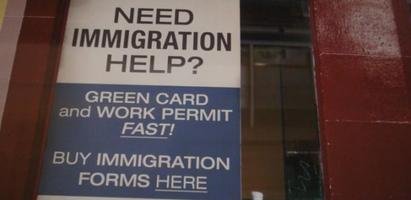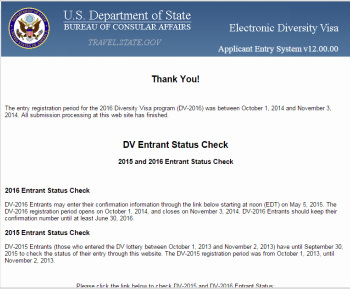SUBMITTED QUESTIONS & ANSWERS can be viewed here or posted below.
1. Policy Clearances.
Some countries will only send police clearances directly to the Embassy/ Consulate (e.g. Hong Kong). How NVC is notified that when Embassy/ Consulate has received the required police clearances so that an appointment can be scheduled? How are attorneys/applicants notified? RESPONSE: 9 FAM 504.4-4(A) outlines the basic document requirements for the immigrant visa process. The Visa Reciprocity Schedule provides further clarification as to availability of documents in a particular country. NVC uses the Reciprocity Schedule during the collection process to determine whether or not an applicant needs to submit the police certificate to NVC for review. If the Reciprocity Schedule indicates the local police authority sends the document directly to the Consular Section, NVC will not request a copy of the document from the applicant and will set an appointment when the case is otherwise documentarily complete. The attorney/applicant should ensure the police certificate is sent to the Consular Section prior to the interview. The Consular Officer overseas will determine the acceptability of the document at the time of adjudication. Please check travel.state.gov, post supplements and post websites for additional guidance.
2. Document Checklists.
Attorneys report that they continue to receive checklists from NVC asking for documents that have already been submitted. Should attorneys resend the same documents to NVC? Or should they send an email to [email protected] to request clarification? RESPONSE: When NVC sends a checklist letter for a document already submitted, please respond to NVC’s concerns by providing a written explanation to the [email protected] mailbox. NVC will re-review the case file in an attempt to locate the document and update the case record accordingly. If attorneys or applicants receive a checklist letter after an appointment has been made and the case has gone to post, applicants should make sure to bring copies of the items requested in the latest or final checklist letter.
3. Civil Documents.
Please confirm NVC’s requirements regarding translation of civil documents. For example, are translations required where the document is to be sent to a post where consular officers speak the language in which the documents are written? Where can applicants find information as to which documents require translations? RESPONSE: All documents not written in English or the official language of the country in which you are applying for a visa must be accompanied by certified translations. The translation must include a statement signed by the translator stating that the: Page 2 Translation is accurate and The translator is competent to translate. Some embassies or consulates may have additional requirements. Applicants should always follow the documentary instructions on the embassy or consulate’s interview instructions on travel.state.gov.
4. CSPA.
It appears that NVC generally does not issue fee bills to dependent children who have turned 21, as they are not able to determine whether the child can benefit under CSPA when the priority date is not current. Often, these children will not age out until 1-2 years in the future; however, if the attorney waits until the priority date is current to request the child’s fee bill, valuable time is lost from the time the fee bill is requested to the time it is actually issued and paid. As such, would NVC consider issuing fee bills for such dependent children when the fee bills are issued for the rest of the family? Allowing the child’s immigrant visa (IV) fee to be paid before the CSPA age is determined by the consular officer at the IV interview would enable the dependent child to “seek to acquire” and potentially lock in their CSPA age, prevent delays for the rest of the family’s IV interviews, ensure that the child is able to immigrate with the rest of the family, and prevent NVC from receiving an influx of fee bill requests when priority dates advance. AILA understands that there may be some cases where the fee bill is paid but the child ages out before the priority date becomes current but notes that most in this situation would opt to pay the fee bill to lock in the CSPA age despite this risk. AILA has raised this with NVC in the past but has not received a final answer from the NVC or Visa Office; as such, please confirm whether DOS has made a decision on whether to issue fee bills to such dependents and allow them to potentially lock in their CSPA age when their parent is current under the Filing Date chart. RESPONSE: The Visa Office and NVC are currently examining CSPA guidelines, including the question of whether or not NVC would be able to issue an IV fee bill in these circumstances.
5. Duplicate Notices.
AILA has received reports from members regarding approved I-730 cases where the attorney and applicant are getting identical approval/transfer notices from NVC at least every other, and sometimes twice a day. Is NVC aware of this issue and if so, is there a reason for the duplicate notices? RESPONSE: Yes, the public made us aware of this issue and we were able to quickly address the underlying technical issue. We appreciate AILA’s regular feedback on these types of issues. Individual attorneys experiencing potential computer errors can use the attorney email, [email protected], to provide feedback. For online issues with CEAC or CTRAC, we recommend providing screenshots of any error messages or incongruities. Page 3
6. Transfer Issues – Tajikistan and Kyrgyzstan. AILA members representing nationals of Tajikistan are receiving notices explaining that their cases have been transferred to Bishkek, Kyrgyzstan with new case numbers reflecting the change. However, the Bishkek Embassy’s website indicates that they do not process immigrant visas. Additionally, the Dushanbe Embassy’s website still states that all immigrant visas are processed via Almaty, Kazakhstan. Has there been a change in processing for Tajik cases? Will all Tajik cases be processed through Bishkek or will processing in Almaty continue for some cases? RESPONSE: The U.S. Embassy in Bishkek will begin accepting IV cases from NVC in November 2016. With this launch in mind, NVC is beginning to assign Kyrgyz applicants to process in Bishkek, instead of Almaty. Bishkek’s website is currently under construction to add IV processing information, and interview instructions for Bishkek will soon be available on travel.state.gov. Tajikistani applicants, however, will continue to process in Almaty, Kazakhstan. If you’ve received notification indicating that a Tajikistani’s case was transferred to Bishkek, we’d appreciate receiving case specific information via [email protected] so we can investigate further.
7. Affidavit of Support. An affidavit of support sponsor is permitted to supplement their income with proof of assets to make up any shortfall of income to meet the affidavit of support requirements. Despite providing proof of value, equity, and ownership of assets, NVC seems to regularly deem the affidavit of support inadequate. Does this information need to be provided to NVC, or can it instead be brought to the interview? RESPONSE: NVC will assess affidavits of support based on the income information provided by the petitioner. As a matter of procedure, NVC staff will not consider proof of assets that were submitted to supplement petitioner income. In any situation where the petitioner’s income does not overcome poverty guidelines, NVC will send an assessment letter suggesting that the applicant bring a joint-sponsor document or other proof of income/assets to the IV appointment. It is important to note that this NVC-generated assessment letter will not hold up the qualification of the case for appointment at post. As mentioned in the assessment letter, applicants should bring any completed joint-sponsor documents, as well as proof of petitioner assets to the immigrant visa interview, where the consular officer will make the final determination regarding the affidavit of support and whether the supporting income and asset documents overcome poverty guidelines.
8. Modernized Immigrant Visa (MIV) Process
a. We understand that the Consular Electronic Application Center (CEAC) has been undergoing significant program developments. Please provide an update on the implementation of the Modernized Immigrant Visa (MIV) application process at the initial six pilot posts. RESPONSE: The Bureau of Consular Affairs is planning a spring 2017 release of a new CEAC module for IV applicants on a pilot basis. This module will feature: Online submission of financial and civil documents; The ability to add or remove derivative applicants online; The ability to change derivatives from accompanying to follow-to-join online; Page 4 NVC feedback and status updates provided electronically; and Online case follow-ups to avoid entering termination status – you no longer need to call or email us once per year, you can simply log into CEAC to prevent your case from entering termination. We will pilot this new module with six embassies and consulates (Montreal, Rio de Janeiro, Buenos Aires, Frankfurt, Sydney, and Hong Kong). b. We also understand that the second phase of the MIV was scheduled to take place in mid- 2016 at six additional posts with lower Internet penetration and where applicants have greater reliance on third-party assistance in order to evaluate the robustness of the CEAC system and its ability to respond to a variety of situations. Please provide an update on the results, to date, of this second phase. RESPONSE: In September 2016, we added eight posts to our electronic processing pilot: Addis Ababa, Baghdad, Guatemala City, Kiev, Monrovia, Phnom Penh, Tegucigalpa, and Tashkent. Applicants processing at these embassies now have the option to e-mail their documents to the [email protected] mailbox rather than mailing hard copies to NVC. We scheduled interviews for the first round of electronic cases at these posts in November. If you have clients from one of these posts, please encourage them to join email processing. Customer tip: Applicants who submit documents via email should not also mail them; that can delay case review. c. What is the current target date for worldwide deployment of MIV processing? RESPONSE: It is too early to give a definitive date for worldwide deployment at this time. We hope to be able to answer this question after our planned pilot in spring 2017.
9. NVC Operations
a. We understand that the NVC is transitioning from a paper warehouse to a customer service center and as part of this process; teams of regional experts have been created to identify and respond to obstacles confronting visa applicants. Please provide an update on the activities of regional teams. Are there any plans to extend this model to the non-immigrant visa application process? RESPONSE: NVC Post Liaisons act as the intermediary between consular sections worldwide and NVC’s regional processing teams. They communicate trends, guidance, interview capacity, and other processing updates between the regional teams and the posts served. Post Liaisons have a thorough understanding of IV processing at posts overseas. They also work with posts to ensure public information is up-to-date and understandable. We are always looking at the service we provide and considering ways to improve customer service. Thank you for the suggestion. b. We understand that NVC added a consular officer to its staff in the fall of 2015 in order to facilitate the relationship between NVC and overseas posts. Has this addition yielded the expected results? RESPONSE: NVC added a consular officer position to its staff in the fall of 2015 to Page 5 serve as the Government Technical Monitor (GTM) of its Case Processing and Document Review units. In addition to providing oversight and IV expertise from the field, the consular officer oversees the new Post Liaison program, described above. c. What is the role of the subject matter expert assigned to the customer service division? RESPONSE: NVC added a consular officer position to its staff in summer 2015 to serve as Government Technical Monitor (GTM) of its Telephone Inquiry and Written Correspondence units. In addition to providing oversight and IV expertise from the field, the consular officer oversees the Special Immigrant Visa (SIV) program and monitors compliance with Personally Identifiable Information (PII) regulations and Freedom of Information Act (FOIA) requests. d. Please confirm the current timeframe for the following: i. How long it takes to receive a file from USCIS after approval of an immigrant petition; RESPONSE: It can take up to six weeks to receive a case from USCIS. ii. How long it takes to enter data in the NVC system once a file is received from USCIS; RESPONSE: As of October 28, 2016, it takes seven business days. iii. How long an applicant should wait after approval of a petition by USCIS before inquiring about the status of the application with the NVC; and RESPONSE: We recommend waiting up to six weeks after receiving notice of petition approval before inquiring with NVC. iv. How long it takes for an applicant or attorney to receive a response from [email protected]; or [email protected]. RESPONSE: As of October 28, 2016, it takes five business days to respond to emails submitted to the [email protected] mailbox and five business days to respond to inquiries sent to the [email protected] mailbox. Please keep in mind that processing timeframes and inquiry response times change weekly based on the quantity of questions and casework received at NVC.
10. Inquiring on Pending Cases
a. At our last meeting, NVC provided the following process for attorneys to inquire about cases pending with NVC. When inquiring about a case, send an e-mail to [email protected]. If you do not receive a response within 15 days, send a second follow-up e-mail to [email protected]. If you still don’t receive a response after 15 days, send a third e-mail to [email protected], with “Attention PI Supervisor” in the subject line. You should receive a response from the PI Supervisor within 5 to 7 business days. Page 6 Are there any changes to this escalation protocol? RESPONSE: Given that we are now responding to attorney e-mails well within one week, we have revised the guidance as follows: When inquiring about a case, send an e-mail to [email protected]. If you do not receive a response within eight days, send a second follow-up e-mail to [email protected]. If you still don’t receive a response after eight days, send a third e-mail to [email protected] with “Attention PI Supervisor” in the subject line. You should receive a response from the PI Supervisor within five to seven business days. b. We understand that NVC receives telephone inquiries regarding processes and procedures relating to the nonimmigrant visa application process. This role is confined to providing general application information, directing applicants to the appropriate consulate web page, identifying the status of an application at a post, and informing applicants of a visa refusal. Are there any plans to expand the role of NVC in the nonimmigrant visa application process? RESPONSE: There are no plans to expand our role at this time.
11. DS-260. Are any planned updates for Form DS-260?
RESPONSE: There are no planned updates for the Form DS-260 at this time.
12. Attorney as Agent.
If an attorney is designated as an agent, is it also necessary to have a Form G-28 on file in order to be able to communicate with NVC on behalf of the visa applicant? RESPONSE: As an attorney, you can either file a Form G-28 or submit a signed statement on your law office letterhead that indicates you are now representing the beneficiary. We accept both of these items as proof that there is an attorney-client relationship, and either can be submitted to [email protected].
13. Revoked I-130s
After Death of USC Spouse Petitioner. AILA has recently received reports of certain I-130 petitions being revoked erroneously after the death of a United States Citizen (USC) petitioner (examples available upon request). Pursuant to 8 CFR 204.2(i)(1)(iv), a visa petition previously approved to classify the beneficiary as an immediate relative spouse of a USC should automatically convert to an approved Form I-360, Petition for Amerasian, Widow(er) or Special Immigrant. Examples are submitted for your review at Appendix A. As a result, I-130 petitions that fall into this category should not be revoked. Although these cases are being revoked by USCIS, they are being sent for revocation to USCIS by the NVC. Is the NVC aware of this issue? If a case is erroneously sent for revocation and an attorney/beneficiary receives notice of such a transfer and/or revocation, what is the process to resolve this error and ensure that the case is properly converted to an I-360 as noted in 9 FAM 502.1-2(C)(c.)(2)? RESPONSE: Thank you for your feedback. You are correct that many IR1/CR1 (and in some circumstances IR2/CR2) cases are eligible for automatic conversion to I-360. Page 7 NVC has an existing procedure in place that converts these petitions upon notification of the death of the petitioner. Thank you for providing examples of cases where AILA believes a petition should have been automatically converted. We note that 8 CFR 204.2 (i)(1)(iv) and 8 CFR 204.2(b)(1) set requirements for automatic conversion. Depending on the facts of the case, if there is a question about whether these requirements were met, the appropriate course of action may be to send a petition to USCIS for review and possible revocation. It is especially difficult for us to determine that a petition was returned to USCIS in error where USCIS in fact revoked the petition. We understand from previous discussions that AILA also intended to raise this issue with USCIS. We look forward to learning USCIS’ response and with this clarity will work to ensure interagency consistency. With respect to the specific examples, we will work with the Visa Office and respond directly to the inquiring attorney. If you encounter similar cases, please send an email with case specifics to [email protected] with “Attention PI Supervisor” in the subject line and we will review the issue for you.
Please see here or here.




















 RSS Feed
RSS Feed